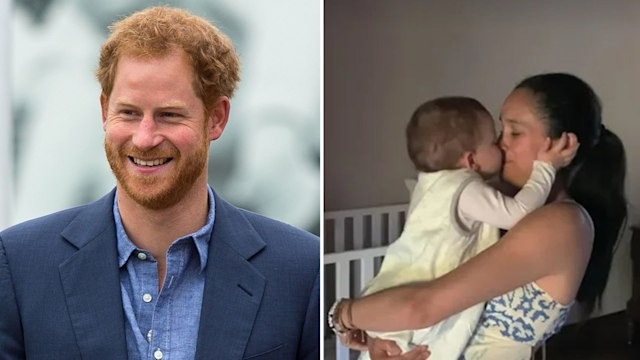In recent years, Prince Harry and Meghan, Duchess of Sussex, have faced constant media attention and speculation about their personal lives, including unfounded rumors involving their children. As public figures who have chosen a path outside traditional royal duties, the couple has continuously emphasized their desire to raise their children — Archie and Lilibet Diana — with dignity and privacy.
Though social media and tabloid narratives often amplify rumors, there is no verified or official record of Prince Harry releasing DNA test results about his daughter, Lilibet, as of this writing.
Royal Children and Public Curiosity
The birth of Lilibet Diana Mountbatten-Windsor on June 4, 2021, was met with public excitement and international headlines. Named in honor of Queen Elizabeth II and Princess Diana, Lilibet’s arrival was seen as a symbolic bridge between tradition and a new generation of royals living outside the UK.
However, the continued public fascination with the royal family — particularly the children of Harry and Meghan — has led to numerous rumors and misleading stories, many of which stem from speculation, not fact.
Lilibet’s identity and her place within the royal family have never been in question in any official capacity. She is eighth in the line of succession to the British throne, according to the official royal website, following her older brother Archie and her father, Prince Harry.

Prince Harry’s Public Stance on Privacy
Throughout interviews, public appearances, and personal projects such as his memoir Spare and the Netflix documentary Harry & Meghan, Prince Harry has consistently advocated for protecting his family’s personal information. He has repeatedly spoken out against media intrusion, emphasizing the importance of drawing boundaries between public duty and private life.
In an interview with The Today Show and other outlets, Prince Harry has stated that one of the driving forces behind his move to California was to raise his children in a safer and more private environment.
According to Harry, the safety, mental health, and well-being of his wife and children take precedence over public opinion or royal tradition.
The Importance of Ethical Journalism and Verified Sources
The recent spread of unfounded stories about Prince Harry allegedly confirming DNA test results has highlighted the importance of relying on verified information and trusted news sources. In the digital age, misinformation can spread quickly, often driven by social media algorithms rather than journalistic integrity.
Organizations such as Reuters, BBC News, and The Guardian have all maintained editorial standards by avoiding unverified claims and focusing instead on confirmed developments. As of now, no credible news outlet has reported any DNA-related announcement involving Prince Harry or his children.
Royal Family and Tradition of Discretion
The British royal family has long maintained a tradition of privacy concerning personal and medical matters. Even during health challenges faced by senior royals like King Charles III or Princess Catherine, official statements are carefully worded and released only when necessary.
Prince Harry’s departure from royal duties in 2020 introduced a more modern and direct communication style, especially through digital platforms. However, even with that shift, the couple continues to respect the boundaries of what should and shouldn’t be shared publicly—particularly when it comes to their children.

Media Coverage and Public Reaction
Despite no official statement on the topic, speculative headlines about Prince Harry, Meghan, and their children continue to circulate. This trend reflects broader issues in media ethics and public appetite for royal news, regardless of factual accuracy.
While some audiences appreciate increased transparency from public figures, others argue for more respectful media coverage that avoids unnecessary intrusion, especially involving minors.
Polls and Public Sentiment
Polls conducted by UK and US outlets over the past few years have shown mixed views regarding the Sussexes’ media strategy. However, a common theme is emerging: a majority of the public supports the idea that royal children, regardless of their family’s status, deserve privacy and protection.
Parenting experts and psychologists agree. According to Dr. Jean Twenge, a psychologist and researcher on public life and families, “The psychological well-being of children is strongly affected by how their private lives are treated, especially when they have no control over the exposure.”

The Sussex Family’s Current Life in the U.S.
Prince Harry and Meghan now reside in Montecito, California, where they are raising their two children outside of the royal spotlight. The family has occasionally shared photos and moments in public settings, such as holiday cards or birthday messages, but largely keep their children’s day-to-day lives private.
They continue to engage in charitable work through the Archewell Foundation, focusing on initiatives related to mental health, community service, digital responsibility, and family welfare.
Their efforts have garnered praise from nonprofits and global organizations alike, and they remain active in projects that align with their values—without placing their children in the media spotlight.
Conclusion: The Value of Privacy in the Public Eye
In an era of instant news, viral headlines, and click-driven journalism, the story surrounding Prince Harry, Meghan Markle, and their daughter Lilibet serves as a case study in the importance of media responsibility.
There is no official evidence supporting the viral claims of a DNA announcement, and promoting such stories without verification can damage public trust in journalism, while also harming the families involved.
As Prince Harry and Meghan continue to prioritize family life and community engagement over royal protocol, they remind the world that parenthood transcends status. Respect for privacy—especially for children—is a principle that should be honored by all, regardless of royal lineage.
Trusted Sources for Reference:
- Royal.UK – Official Royal Family Website
- BBC News – Royal Family Coverage
- The Guardian – Royal Family Reporting
- Reuters Fact Check
- Archewell Foundation


